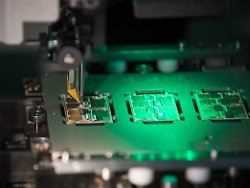Monday, September 6th, 2021
Growing risks for suppliers
No recovery in sight from the semiconductor crisis
The shortage of electronic chips is further slowing the recovery of the auto industry. Industry experts from the management consultancy PwC do not expect any short-term recovery in supply. According to the experts, especially small suppliers have to be prepared for large fluctuations.
The management consultancy PwC assesses the production and sales plans of the auto industry in view of the semiconductor crisis with great skepticism. The expansion of semiconductor production facilities takes up to two years, the construction of new plants even five years – therefore “no short-term recovery in the supply of semiconductors is to be expected,” said PwC expert Tanjeff Schadt before the start of the IAA auto show.
“The negative effects of the semiconductor crisis are enormous and have so far reached almost 50 percent of the effects caused by Covid-19 in 2020,” said PwC automotive industry expert Thomas Steinberger. In the first half of the year, 4.0 million fewer cars were built than planned. Volkswagen was therefore 21 percent below plan, Ford 18 percent, Stellantis 15 percent, GM 12 percent, Daimler 2 percent. BMW is only now hitting it. In view of constant short-term production downtimes and the situation with suppliers, the planned increases in the third and fourth quarters should be “critically examined”, warned the experts.
For small suppliers in particular, the risks increased: “Persistent planning uncertainty could have domino effects that could trigger an increased need for restructuring.” In particular, suppliers with a high dependency on individual regions, car manufacturers and vehicle classes “will have to adjust to large fluctuations”. The auto industry is in a relatively weak negotiating position with semiconductor manufacturers. Because today no car can move without semiconductors, from the drive to the assistance systems they are needed everywhere. But for the semiconductor industry, the auto industry is only a rather small customer compared to the IT industry or consumer electronics.
Worldwide auto production slowed down
According to industry experts, the world’s largest semiconductor contract manufacturer TSMC in Taiwan is by far the largest supplier for the automotive industry – but conversely, TSMC only makes 3 percent of its sales with the automotive industry. When the auto industry cut its orders during the Corona lockdowns in 2020 and quickly increased them again in 2021, there were bottlenecks. In addition, a chip factory in Japan that is important for the auto industry burned in March.
Car production was slowed down worldwide – especially in Europe and the USA, least of all in China. Semiconductor companies demanded purchase guarantees before further investments, the relationship with the auto industry is tense, it said. PwC consultant Marcus Gloger sees a long-term way out in “close partnerships with semiconductor manufacturers up to and including Co-Invest in order to secure future needs and access to the important semiconductor technologies”.
.
